In recent years, artificial intelligence (AI) has been growing faster than you can imagine. Tech giants like Google, Microsoft, Amazon, and Apple are focusing heavily on AI development and investing significantly in acquiring AI talent to lead innovation. These companies are pouring billions of dollars into AI research and development, actively seeking to acquire the brightest minds in AI by hiring top researchers, engineers, and data scientists from leading universities and research institutions. Securing the best talent ensures they remain competitive in this fast-evolving industry. They are also purchasing additional companies. One instance is when Google purchased DeepMind, while Microsoft partnered with OpenAI, and Amazon developed Alexa.
Let’s discover the latest significant investments and AI talent acquisitions made by these tech giants, demonstrating their impact on advancing AI and fostering innovation in a world increasingly driven by artificial intelligence.
1. Google’s AI Talent Acquisition
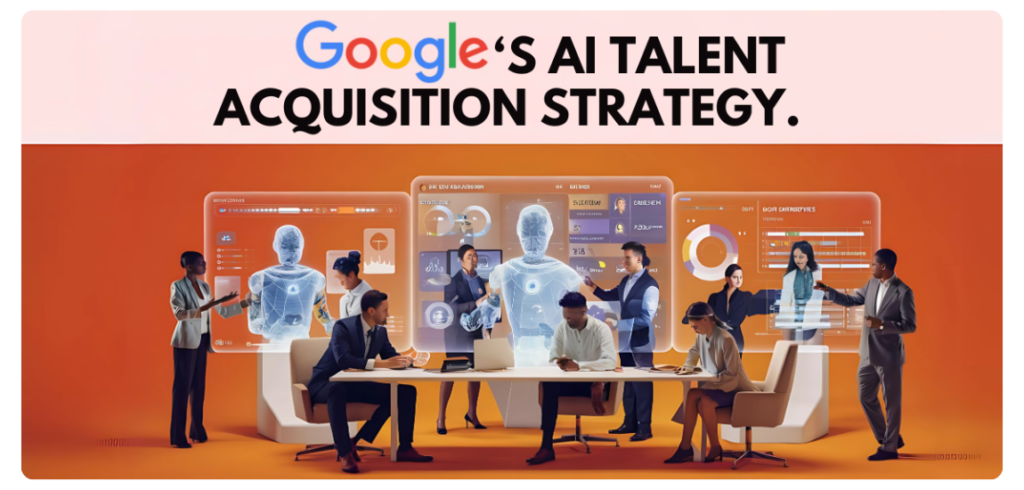
Google uses many ways to hire the brightest minds in AI, such as offering competitive pay, rehiring strategically, and dealing with immigration issues. They are also confronted with strong competition from other technology giants such as Meta and OpenAI.
Competitive Compensation Packages
They offer lots of money to make top AI talented people stay in their company. For example, Google pays big, like billions, to get Noam Shazeer back, an AI expert who had previously left the company. Google paid $2.7 billion to rehire him again. Other examples include:
- Jeff Dean: A renowned computer scientist who joined Google in 1999 and has been a key figure in the company’s AI efforts.
- Quoc Le: A leading expert in deep learning who joined Google in 2013 and has made significant contributions to the development of AI technologies.
- Fei-Fei Li: A renowned computer vision researcher who joined Google in 2017 and has been instrumental in advancing Google’s AI capabilities in this area.
Through these examples, you can see that Google really wants smart people. Also, OpenAI gives up to one million each year, which is a lot.
Strategic Rehiring and Retention
Google has shown interest in rehiring former brilliant-minded employees who have left the company for some reason, even if it comes with a high price tag. As we have seen in the case of Noam Shazeer, a notable example, Google paid him a large sum to bring him back after he quit his job in frustration. Through this strategy, google is able to show its employees that the company appreciates their contribution and is committed to keeping them on board.
Navigating visas Challenges
As you know, Google is acquiring AI talent from all around the world to lead at the top in the field of AI. However, due to stringent visa regulations in the U.S., Google is facing difficulties in bringing people from other countries. So they use H1B visas a lot, but it can be restrictive and hard for foreign talent to switch jobs without risking their residency status. Nevertheless, Google asks the U.S. government for better rules to attract global talent.
Competition from Other Tech Giants
Other big companies like Meta also want AI-smart people. And actively Investing their money in AI Talent Acquisition. They come across AI researchers from DeepMind at Google, occasionally through personalized emails from top executives like Mark Zuckerberg. Meta regularly updates its policies to offer improved compensation to job seekers who have received job offers from other companies, creating a highly competitive hiring process. So, Google needs to work hard to keep the best AI talent due to the intense competition.
Specialized Roles and High Standards
AI jobs need special skills and degrees. Only a few people have Masters or PhDs. OpenAI only hires those strong in the field with papers. Google also wants the best brains to join their team. Google faces a big fight from other tech giants like OpenAI. They try to hire the best by giving high salaries. This makes competition very tough. Google stays active in finding and keeping talent.
2. Microsoft’s AI Focus:
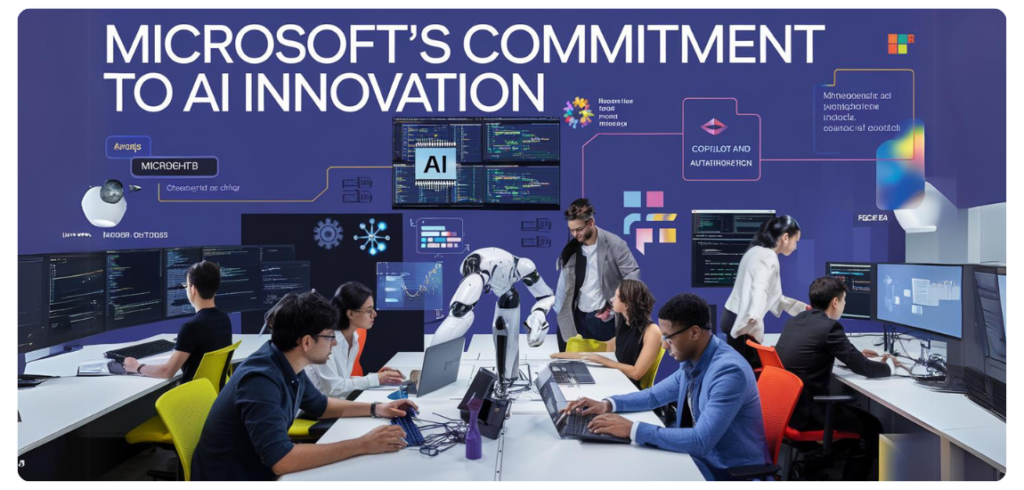
Microsoft is also working on AI development with the help of doing lots of projects for both the computer parts and the programs.
1. AI Chips
Microsoft is focused on enhancing AI, engaging in numerous projects for both hardware and software. They create specialized chips called “Athena” to enhance the speed of their AI operations, which are likely for use in Azure and similar to Google’s use of TPUs. Large technology companies are manufacturing their own AI hardware to reduce their dependence on external companies such as NVIDIA.
2. AI Integration in Products
AI is being integrated into numerous Microsoft products, including Microsoft 365, in order to assist individuals in accomplishing a greater amount of tasks. Copilot is a tool that utilizes artificial intelligence to assist with various tasks. Moreover, they are developing AutoDev, a tool that aims to simplify the process of writing code by automating certain tasks.
3. Partnerships and Investments
They put a lot of money into OpenAI, a group that does a lot of AI research. This lets Microsoft use really smart AI, like GPT-4, in their stuff. Working with OpenAI is important because it helps them keep up with other big tech companies, like Google.
4. AI Research and Ethics
Even though some people who worked on making sure AI is used ethically were let go, Microsoft still has a team to make sure AI is used in a good way. This shows they care about using AI responsibly, even when there’s a lot of competition.
5. AI in Cloud Services
Microsoft is also putting AI into its cloud services, especially Azure. This means businesses can use advanced analytics, machine learning, and other cool AI things.
3. Amazon’s AI-Driven Products and Services
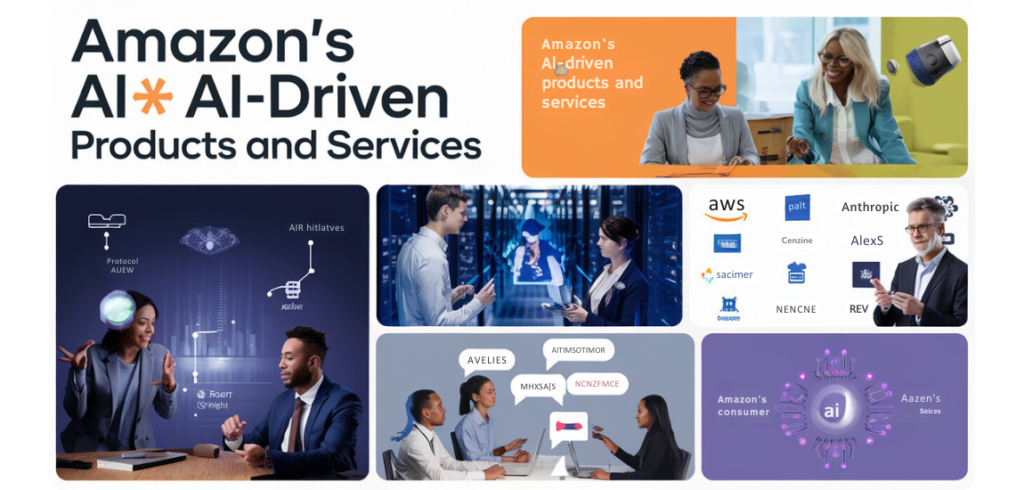
Amazon is putting a lot of money into AI products. Amazon has made its largest investment in artificial intelligence in Alexa, its popular voice assistant. Moreover, through focusing on its cloud services (AWS), forming strategic partnerships, and providing substantial financial backing to AI firms such as Anthropic. Their attention ranges from developing business solutions to improving their existing product offerings.
Cloud Services and Infrastructure
They are utilizing their large cloud platform, AWS, to assist in their expansion. Amazon has invested a significant amount of money in creating dedicated data centers, allocating $150 billion over an extended period to ensure they have sufficient resources for artificial intelligence and digital technologies. They believe that there will be a growing demand for AI and digital services in the near future.
Strategic Partnerships and Investments
Amazon is collaborating with other companies that specialize in artificial intelligence technology. They provided significant funding to Anthropic, establishing them as key players in the AI industry alongside Microsoft and Google. This assists AWS in enhancing its AI capabilities and providing innovative tools to its clients.
Enterprise Solutions
Amazon is also working on AI solutions for big businesses. They have a chatbot named Amazon Q that helps companies be more productive. This shows how Amazon wants to make AI help businesses work better and be creative.
Consumer Products
Amazon is not just helping big companies, they also make things for regular people. Alexa is their voice assistant, but they not putting as much money into Alexa because it not making as much money as they hoped. Even so, Alexa still helps Amazon make more money from people buying things on their website.
Sustainability and Future Growth
Amazon cares about the Earth too. They invest in clean energy to power their big data centers, so they can be green and keep growing. This means Amazon will keep leading in cloud services and AI for a long time.
In the end, Amazon’s plan for AI is very big and has many parts. They invest in the cloud, partner with other AI companies, and make both big and small AI things. This makes Amazon very important in the AI world and helps them stay the best.
4. Apple’s AI-Powered Features

Apple wants to improve Siri (digital assistant AI) with new AI-powered features to improve the user experience. They have connected Siri with advanced generative AI models, offering smarter personal assistance. Through this, they aim to make Siri more efficient and personalized for daily tasks.
Enhanced Siri Capabilities
Apple has upgraded Siri with new AI functionalities. Siri has become more intelligent, like ChatGPT and its conversational abilities have improved. This enhancement allows Siri to handle complex tasks such as summarizing lengthy texts, aiding with notes, and setting reminders.
AI in iOS 18 and MacOS
iOS and Mac get new AI tools to help you. These AIs help you organize your schedule, remind you, and suggest things based on what you like. Some people are sad because these AIs only work on the new iPhone 15 Pro.
Privacy and On-Device Processing
Apple prioritizes privacy by conducting AI processes on users’ devices. This approach ensures data security and enhances AI performance speed. Siri Summarization utilizes on-device processing to generate summaries while safeguarding user information.
Practical Applications
AI within the Apple ecosystem simplifies daily tasks for users. It assists in scheduling meetings, composing concise emails, and organizing photo collections. These tools streamline tasks, reducing confusion and optimizing time management.
Future Prospects
Apple strategically integrates AI into its devices, prioritizing effectiveness over immediacy. They wait for AI technologies to mature before implementing them, ensuring seamless integration and enhanced user benefits.
User Experiences and Recommendations
People have mixed feelings about Apple’s AI. Some like Siri is better, some upset old phones can’t use all AI things. Most people think Apple’s AI is good and that it helps them a lot.
Apple’s AI features make you more productive, personalize things for you, and keep your info private. There are some problems, but overall, AI helps a lot in making tech better for users.
6. Baidu’s AI Advancements
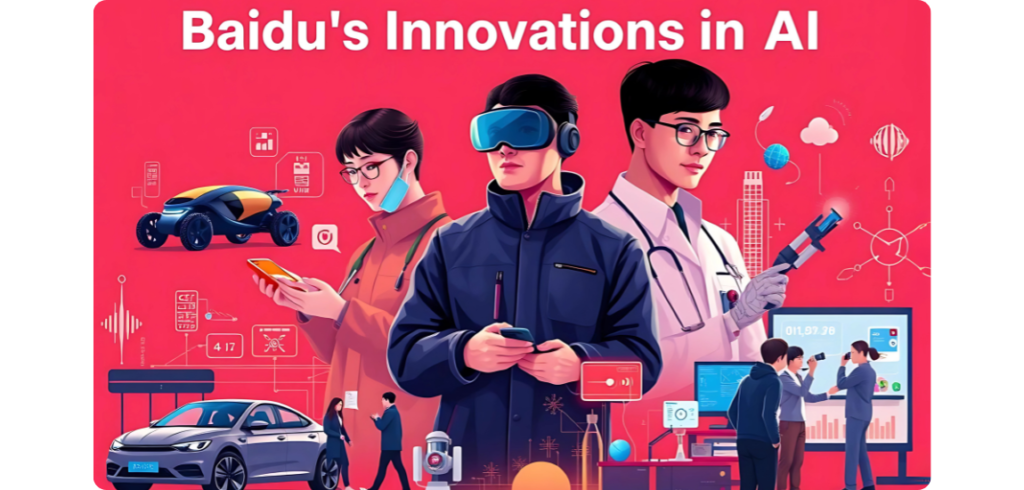
Baidu is big in AI, especially in China. They invest a lot of money in research, creating new products, and hiring smart people, such as AI experts. It’s all about staying at the top. This spending helps them advance in AI and puts Baidu ahead on various projects, changing the future of technology.
Apollo Project
The Apollo Project is impressive. It’s Baidu’s self-driving car project. They are developing super-smart cars that can drive themselves. They constantly update it, make deals with car companies, and expand globally. Apollo is a significant achievement not only in China but worldwide.
DuerOS Voice Assistant
Then there’s DuerOS, their voice assistant. It is similar to talking to your phone, but it works with various gadgets in China. It responds, controls lights, plays music, and helps find information. Thanks to advanced technology and AI, it offers a unique experience.
AI Research Labs
Baidu has established AI labs where they conduct research and teach computers to recognize objects and understand human speech. They continue to hire talented individuals to stay innovative in AI. They collaborate with schools, researchers, and tech companies to enhance their AI capabilities.
Partnerships and Collaborations
Baidu is determined to keep investing in AI to remain a leader in the tech industry. They are committed to advancing their technology and remaining at the forefront for a long time.
7. Meta’s (Facebook) FAIR Research Lab
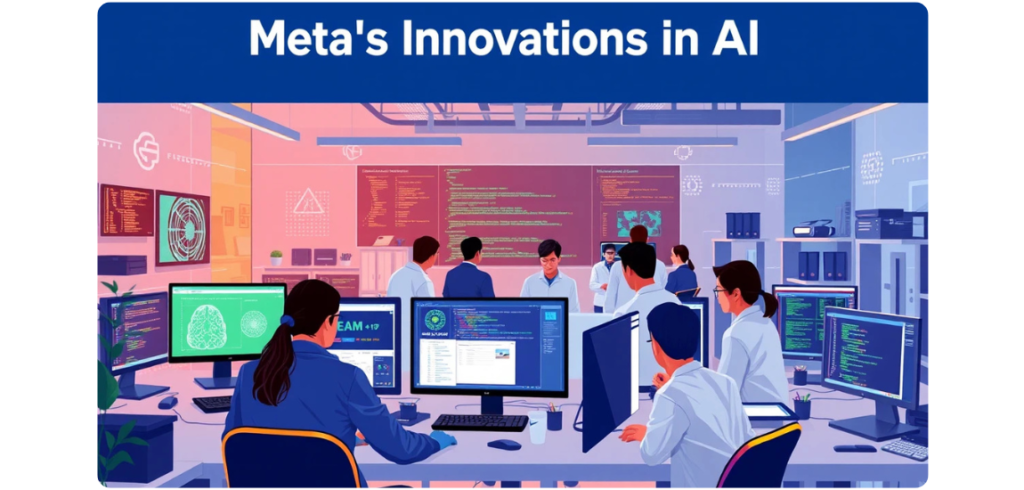
Meta sure has been putting a lot into AI, trying hard to bring in smart folks and make things better. They are sharing open-source models, making their own AI chips, and letting the whole community help out too. That way, they can get more bright people, make their stuff work better, and stay on top in the AI game.
Open-Source Moves
Meta continues to release AI models and tools such as PyTorch, Segment Anything, and DINOv2 for anyone to utilize. By making these resources open source, they can gather ideas from a variety of individuals and demonstrate their significance in AI. Observing Meta’s commitment to open source makes it easier to attract top researchers who appreciate collaboration and innovation.
AI Chip Progress
In addition, Meta has been developing their own AI chips to ensure optimal performance of their models. These chips enhance the efficiency of AI operations, minimize power consumption, and enable Meta to handle complex AI tasks seamlessly. As they improve their software, they also prioritize the hardware capabilities.
Strategic Benefits
Sharing AI models allows Meta to gain advantages in the field. This approach enables them to integrate innovative concepts from sources beyond their own, reducing reliance on external companies. Furthermore, it appeals to talented individuals in AI who prefer working with open-source technologies, fostering collaboration and visibility.
Talent Acquisition
Meta’s commitment to open source and cutting-edge technology positions them as an attractive employer for skilled AI professionals. Their dedication to sharing knowledge and expertise in AI distinguishes them as leaders in the field, attracting top experts to join their team. As they continue to expand their AI talent pool, Meta accelerates progress and maintains a competitive edge.
Challenges in Competition
Unlike Meta, companies like OpenAI are more hesitant to share AI advancements due to concerns about competition. Meta’s transparent approach to AI sets them apart, fostering collaboration with researchers and facilitating the exchange of innovative ideas within the community. While others become more guarded, Meta’s open-mindedness establishes a unique position in the industry.
Future Initiatives
Meta is not solely focused on the present but also considers future advancements. They aim to embed AI in various applications, such as developing chatbots and smart assistants and enhancing user experience in their apps. By attracting talented individuals and advancing technology, Meta anticipates staying ahead in the rapidly evolving AI landscape.
Meta’s emphasis on open-source initiatives, chip development, and community collaboration places them at the forefront of AI innovation. Their pursuit extends beyond acquiring the latest technology to cultivating a community of bright minds. This strategy benefits their products and overall business operations.
8. NVIDIA’s Acquisition of Mellanox and Arm
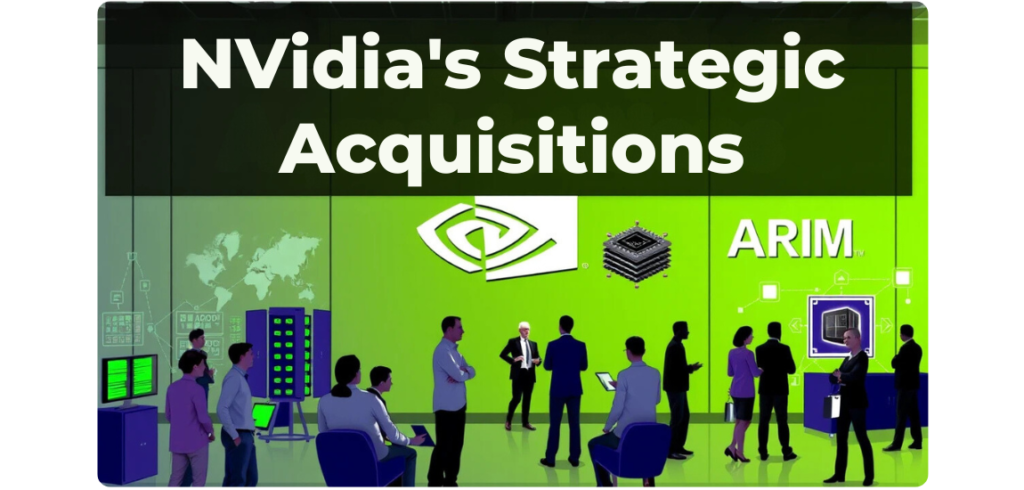
NVIDIA purchases companies (Mellanox and Arm) to strengthen their position in AI. They enhance their AI capabilities through the acquisition of AI talent. This positions NVIDIA as a prominent leader in the AI industry. Their success can be attributed to early involvement in scientific communities, the development of a robust software known as CUDA, and strategic business decisions.
Strategic Acquisitions: Mellanox and Arm
NVIDIA buys Mellanox for a substantial amount (approximately $7 billion). The reason for the acquisition of Mellanox is to enhance NVIDIA’s data center capabilities by utilizing Mellanox’s rapid networking technology, which boosts NVIDIA’s artificial intelligence abilities. Furthermore, NVIDIA made an effort to acquire Arm in order to enhance their chip technology. Nevertheless, because of regulatory problems, this acquisition was unable to be finalized. In spite of this hindrance, incorporating Arm’s intellectual property could have significantly boosted NVIDIA’s exposure in different markets, such as mobile and IoT devices.
AI Talent Acquisition and Ecosystem Development
NVIDIA’s dominance in AI comes from its early partnership with the scientific community. By building connections with scientists, their GPUs are commonly used. CUDA, a technology created by them, allows computers to complete a range of tasks, drawing in AI experts to utilize NVIDIA GPUs.
Advancement in AI Development
NVIDIA is at the forefront of AI advancements, excelling not just in hardware but also in software. They provide a wide array of artificial intelligence tools that surpass those offered by AMD and Intel. Their graphics processing units are very efficient for artificial intelligence tasks, and tools like CUDA make it easier to create and utilize AI models. Moreover, NVIDIA has created specific AI parts such as Tensor Cores, giving them a competitive advantage. These cores, which are intended for tasks involving deep learning, function with greater efficiency compared to older GPUs.
Challenges and Competition
Despite their strength, NVIDIA faces competition from companies like AMD and Intel. AMD’s acquisition of Xilinx poses a challenge to NVIDIA in AI. FPGAs can accelerate AI tasks, giving AMD a competitive advantage. Intel is also expanding its AI capabilities by developing its own GPUs and utilizing their manufacturing facilities. While NVIDIA remains a leader, increased competition could impact their sales and margins.
NVIDIA’s acquisition of innovative companies, combined with their strong software teams and talent acquisition strategies, solidify their position as a leader in AI technology. By collaborating with scientists early on and continuously developing new AI hardware and software, they maintain a competitive edge. However, with growing competition from AMD and Intel, NVIDIA must continue innovating to stay ahead.
9. IBM’s Watson AI and Data Science Initiatives
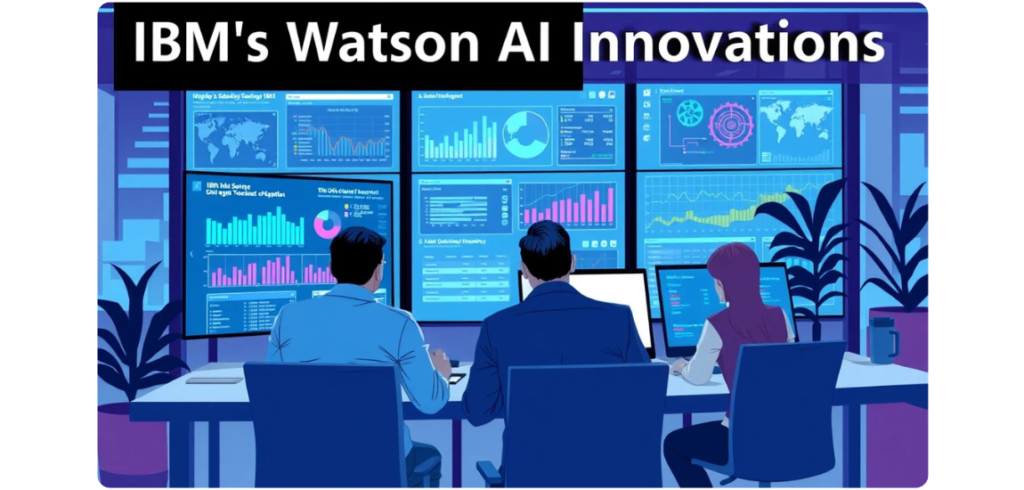
IBM’s Watson AI has faced challenges and setbacks despite ambitious goals. IBM continues to invest in AI and quantum computing, however, it faces challenges due to corporate mismanagement and competition from other tech giants.
The Mixed Success of Watson AI
IBM creates the Watson artificial intelligence. It was a major event. It was considered impressive when it emerged victorious on Jeopardy! However, Watson functions poorly in alternative locations. Doctor’s offices are not very fond of it. IBM is earning a large sum of money by selling certain parts of Watson Health. This demonstrates that Watson is facing issues. The executives at IBM did not perform well with Watson. They lacked a solid strategy for it. Watson becomes puzzled and is unsure of the next course of action.
AI Talent Acquisition and Job Replacement
IBM plans to lay off around 7,800 employees and replace them with robots, aligning with the industry’s shift towards automation. Other major corporations are also utilizing advanced technology, such as smart computers and tools like GPT-4, to select and hire new employees. Some individuals are concerned about this, questioning its fairness or goodness.
AI Leadership Among Tech Giants
Microsoft and Google invest heavily in creating the most advanced quantum computer. IBM attempts various approaches, exploring unconventional scientific concepts, but is not as proficient as others in the field of quantum computing. IBM’s assistance is overpriced and they frequently alter their services.
Challenges in Innovation and Corporate Culture
IBM is a large corporation. The dull regulations stifle the birth of fresh concepts. Intelligent individuals are employed there yet become exasperated. They depart for alternative employment opportunities. IBM is no longer proficient with innovative technologies.
Quantum Computing and Future Prospects
IBM is working on developing Quantum Computers. They are tiny and quick. Perhaps in the future, they might assist with complex mathematics, however, their functionality remains unknown for now. Creating it requires a significant amount of funds.
Watson demonstrates the difficulty of creating an intelligent computer. IBM is putting in a lot of effort but encountering difficulties. Other companies are performing well. IBM must address internal issues in order to succeed once more. Perhaps an unusual computer could provide assistance, though there are no guarantees.
10. Tesla’s Dojo AI Supercomputer and Self-Driving Program
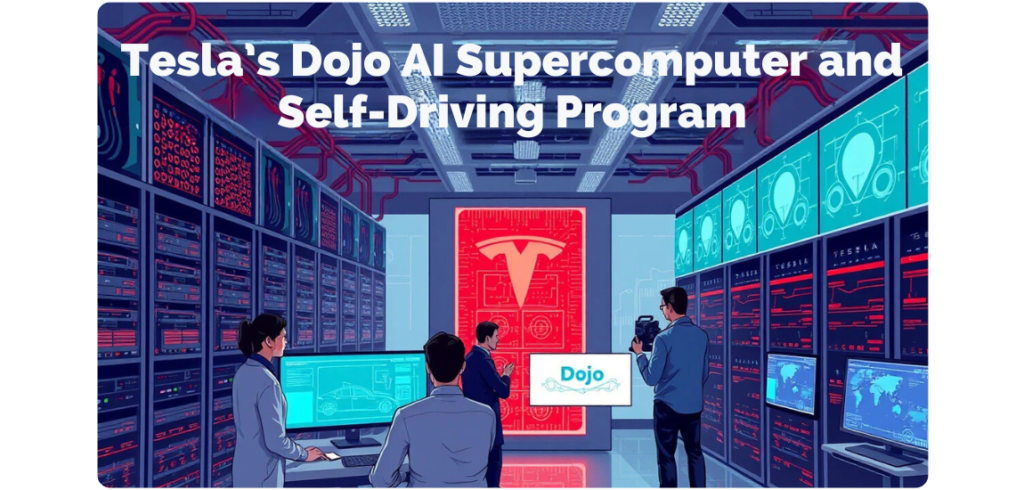
Tesla manufactures a large advanced machine named Dojo. Dojo aids in enhancing the visibility of vehicles. Some individuals believe that it will not be effective. However, Tesla claims it has a high speed. It aids cars in fast decision-making.
Dojo AI Supercomputer
Development and Capabilities: Dojo is still unfinished. Intelligent individuals inquire about it by posing tough inquiries. They are concerned about its effectiveness. However, many individuals are eager to witness its capabilities.
Challenges and Skepticism: Tesla aims for Dojo to enable cars to drive autonomously. It is meant to quickly view videos. This assists vehicles in understanding their surroundings. However, there are individuals who doubt Dojo’s capabilities despite Tesla’s claims.
Self-Driving Program
Tesla is working on developing a self-driving vehicle known as FSD. It is still not functioning perfectly, prompting concerns about safety among people. Tesla announced plans for enhancements. Tesla has numerous vehicles driving on the streets. They collect data from the vehicles to improve the intelligence of FSD. Other companies have a different approach; they restrict cars to specific areas for driving.
There is debate among individuals regarding the timing of when cars will fully be able to drive themselves. Tesla predicts it will occur shortly, while others believe it will be a lengthy process. The true answer is unknown to anyone. FSD occasionally encounters significant issues. Despite numerous assurances from Tesla’s CEO, the company’s performance remains imperfect. This has angered certain individuals.
AI Talent Acquisition and Integration
Strategic Moves Elon provides chips to a different company Like Nvidia AI chips to xAI, not Tesla. He desires to ensure that all of his businesses collaborate effectively. Perhaps Xai will receive payment from Tesla in the near future. This causes concern among Tesla employees. They believe Tesla will no longer receive quality products. However, Elon has a grand scheme. He is not concerned with the present, his focus is on the future.
Elon aims to ensure that intelligent computers function in all locations. He believes that this will lead to victory for his businesses. However, there are individuals who believe that Tesla is currently experiencing some negative impacts. Chips play a role in creating intelligent computers. Tesla has utilized them previously. Now they are acquired by another company. Uncertainty exists regarding the quality of this idea.
Broader Implications for AI Development
Large corporations compete to develop the most advanced smart computer. Tesla operates in a unique manner. They possess belongings that are unique to them. However, Tesla must address issues in order to be successful.
Future Prospects Tesla invests a large amount of money in intelligent computers. They desire to excel in it. If Dojo and FSD perform effectively, Tesla will become an exceptionally unique company. Tesla is making a strong effort to develop self-driving vehicles. They aim to alter the way in which individuals utilize vehicles. However, accomplishing it is extremely difficult. There are numerous issues that require resolution.
Other companies are also endeavoring to create intelligent computers. Tesla must put in a lot of effort in order to surpass them. If Tesla emerges victorious, it could potentially revolutionize both the automotive and computing industries. Tesla has grand aspirations. Their goal is to create highly intelligent cars. However, there is still much work that needs to be completed. Perhaps by resolving all the issues, they are able to transform the entire world.

